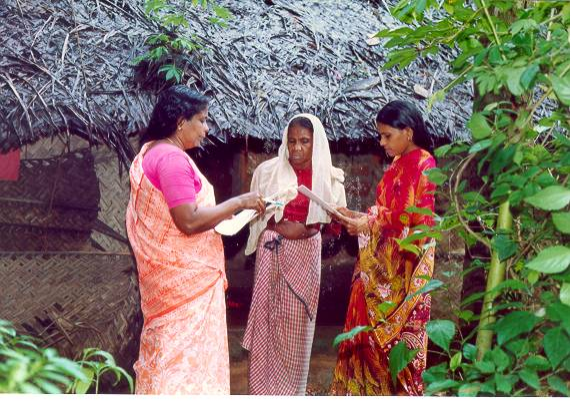Accessibility, affordability, and availability of technology options are crucial for the survival of safe water businesses, says Fanny Boulloud of the Swiss Antenna Foundation. As a partner in the 'Safe Water Phase 2' programme, IRC spoke to Boulloud about business viability at a stakeholder workshop in Nepal in the fall of 2017.
Published on: 22/12/2017
The Safe Water programme focuses on replicating successful business models for household water treatment and storage systems. It supports seven social enterprises from India, Guinea Conakry, Nepal, Cambodia, and Pakistan to market their solutions, in particular to marginalised populations.
Understanding local context
Three years into Phase 2 of the Safe Water programme, what lessons have emerged so far?
“Key to the success of the businesses is knowledge of cultural norms and practices”, says Fanny Boulloud. Social enterprises need a good understanding of the local context to create a demand for safe water technologies and make their businesses viable.
In Nepal for example, people mainly drink water from natural sources. They are unlikely to pay for a service unless they understand that their previously clean sources are now polluted. This kind of information is crucial when starting a business. Knowledge of local standards and compliance requirements, government engagement and the state of existing water schemes are important too, says Boulloud.

Access to finance
Limited access to finance impedes the viability of small businesses. Showcasing successful business models globally will, hopefully, stimulate interest from donors to increase investments in the WASH sector, she says.
Some of the strategies that the Safe Water Programme is using to help the businesses include attracting external financiers and managing the expectations of the private sector, business development support and promoting internal saving. About half of the seven businesses are already showing improvement as a result of engaging with government and finance partners.

Climate change
Extreme weather, including prolonged drought or flooding, affects water sources. The threat and impact of climate change are real, says Boulloud. This is something water businesses need to take into account.
Big companies can sometimes use carbon credits as an additional source of finance. But for small water businesses, they remain largely inaccessible due to the long and therefore costly bureaucratic and administrative processes. Read more about carbon credits and the Safe Water programme.
A viable future
Summarising, to make a small business viable, the technology or service they provide should be accessible, affordable, and available, says Boulloud. At the workshop in Nepal, some of the social enterprises demonstrated their viability with business pitches ranging $60,000 to $3 million. This was an eye-opener for development partners at the workshop.
Social entrepreneurs can provide a meaningful contribution to achieving Sustainable Development Goal 6.1: universal and equitable access to safe and affordable drinking water for all. The Nepalese government representative present at the workshop pledged their support by committing to eliminate taxes on safe water technologies and strengthen local standards.
About “Scaling up Safe Water Phase 2”
For 15 years, Antenna Foundation has been working on business models and tools to help rural communities get access to safe water. Between 2015 and 2018, the Geneva-based NGO worked on this four-year programme, with support from IRC, the Freshwater Action Network South Asia (FANSA), funded and supported by the Swiss Development Cooperation (SDC) and Aqua for All.
This article is based on an interview with Fanny Boulloud of Antenna Foundation during a stakeholder workshop in Nepal, September 2017.